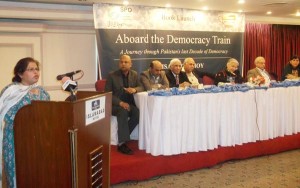
ISLAMABAD, Feb 20: Violence on campus was a gift from the right wing, and the politics of violence were introduced by the same students once they graduated. This was the consensus among speakers on Tuesday at the launch of journalist Nafeesa Hoodbhoy’s book, ‘Aboard the Democracy Train: A journey Through Pakistan’s Last Decade of Democracy’.
The gathering included many who once were students, later political activists and journalists. Decades later, they were sharing memories of their days of struggling against brutal and tyrannical regimes.
“There are few books which chronicle political and journalistic struggles in Pakistan, but this book is a continuation of Zameer Niazi’s books on the press which were authored around the end of the Ziaul Haq era,” said journalist Zahid Hussain.
Strengthening Participatory Organisations (SPO) Chief Executive Naseer Memon called the book an absorbing account with a living storyline of the tumultuous ‘80s and ‘90s “when politics was struggling and general and army was ruling.”
Memon shared the current situation in Sindh and underscored that religious and ethnic rivalries created in the once-secular society of the province were not “homegrown” but were “injected into society by the establishment”.
Senator Mir Hasil Bazinjo, who was a student leader at Karachi University at the time, admitted that it was a mistake by progressive forces to support an urban ethnic group to counterbalance the power of the religious group. “I was a student and often would have problems with the Jamat-e-Islami, which was funded and aided by Zia.” He said it was the time when weapons made their way into campuses and students were killed due to their allegiances with liberal and social groups struggling for a viable, peaceful Pakistan. The ethnic group was later patronised by the establishment, which led to the current crisis.
About the book, he said, “It is an account with personal touch and it helps us remember what we have experienced till date.”
Defence analyst Ayesha Siddiqa said that in the contemporary media age, “We have short memories with no sequence of events and its ramification.”
She talked about the difficulties in identifying real news in this age, as “different people come in the garb of religion, liberalism or in the name of national interest.”
On a related note, M Ziauddin, the executive editor of The Express Tribune, pointed out that the media in Pakistan is market-driven, rather than news-driven. He cited this as a reason that most media outlets exercise self-censorship to protect their commercial interests.
Khawar Mumtaz, Chairperson, National Commission on the Status of Women and chief guest on the occasion said reading the book triggered the frightening ambience of Zia’s era of violence and tyranny. “It reminded me of the days when religiosity and violence was flowering and blossoming under the umbrella of the state,” she said.
She recalled the days when Hindus and Parsis were her classmates and they lived in peace and tranquility. “There is a need of more such accounts for the current generation to remember what has been done in the past and how did they come to the current crisis.”
Hoodbhoy called the book a narration of her “experience as a reporter and eyewitness to many accounts from 1988-99” and shared how the “strings of even a civilian government were being pulled by somebody from outside to derail the democratic process.’
Published in The Express Tribune, February 20th, 2013.
Source: http://tribune.com.pk/story/509794/book-launch-violence-we-are-reaping-today-was-sowed-in-80s/

